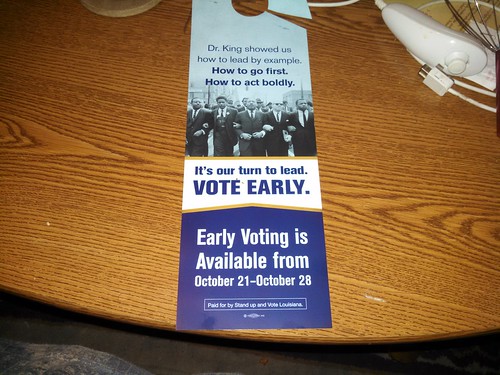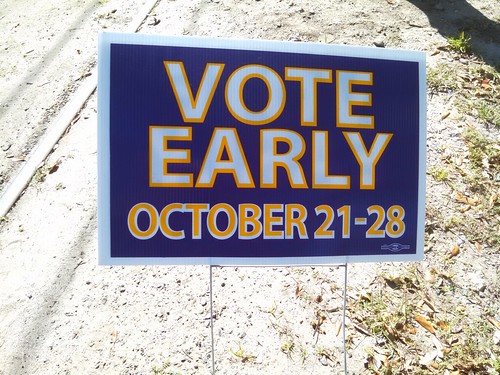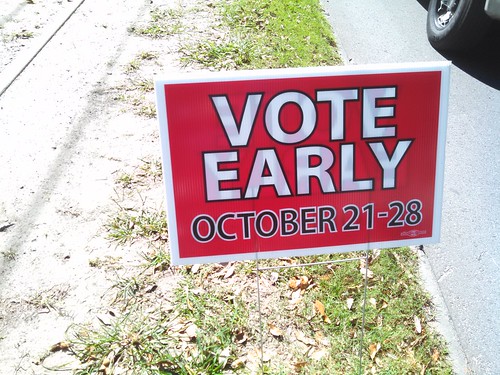
If you're in Orleans Parish, chances are you've pulled one of these hangers off of your front door this week. You're also likely to have noticed similarly designed signs on the neutral grounds.

They also come in red.

The signs and the hangers merely inform of the dates available for early voting in the 2014 election. (October 21-28, except Sunday. See here for early voting locations.) Reading the Times-Picayune's account of things, though, one almost gets the impression this public information campaign amounts to some sort of nefarious conspiracy.
The purple and gold signs popped up, seemingly overnight, along New Orleans boulevards and neutral grounds last weekend to cajole residents to "Vote Early."All the signs do is encourage people to take advantage of the early voting period. They endorse no candidate or issue. And yet, the T-P story suggests to us a "mysterious" dirty trick is at work. The conservative blog, The Hayride, posted a photo of one of the door hangers today and expressed a similar suspicion.
There are reports of them in Baton Rouge as well.
Who planted them so far is a bit of a mystery. Where they came from is, too, although a little footnote on each says they were printed in a union-labor shop.
What is clear is that should they succeed in their mission to remind voters to exercise their right during the early voting period, which begins Tuesday (Oct. 21) and lasts a week, the results almost certainly help U.S. Sen. Mary Landrieu, D-La., in her pitched battle to hold on to her seat.
This week, a mail-out was sent out on behalf of Democrats by a group called “Stand Up and Vote Louisiana.” However, the group is not a registered entity with the Louisiana Secretary of State, the Louisiana Board of Ethics or the Federal Election Commission.What could be wrong with that? Well... something.. probably.. right? That seems to be the implication.
But what is wrong with encouraging people to vote? According to the T-P, doing so would "almost certainly help Mary Landrieu," which is apparently unfair for some reason.
Landrieu needs to boost turnout in her hometown, a Democratic stronghold, and other urban areas across Louisiana to fend off U.S. Rep. Bill Cassidy, R-Baton Rouge. The majority of the New Orleans electorate is African-American and Democratic, and blacks disproportionately tend to vote early rather than on Election Day, said UNO political scientist Ed Chervenak.So encouraging black people to turn out and vote benefits Mary. And this effort to encourage black people to turn out and vote early is "mysterious." Therefore.. by way of a little transitive reasoning.. The Hayride and the Times-Picayune are suspicious of black people voting.
So by way of a little transitive reasoning, those signs stand to benefit Landrieu.
They're not alone, of course. Voter suppression has long been a favorite tactic of conservatives and one that has come more and more into fashion as of late. Texas, for example, recently passed a voter ID law which the US Supreme Court, shockingly, allowed to be implemented last week. Justice Ginsburg's dissent complained that the law is clearly designed to prevent minorities and poor people from voting.
Importantly, Ginsburg concluded that the effect of the law in its entirety would be to diminish voter confidence in the system. “The greatest threat to public confidence in elections in this case is the prospect of enforcing a purposefully discriminatory law, one that likely imposes an unconstitutional poll tax and risks denying the right to vote to hundreds of thousands of eligible voters,” she wrote.This is the kind of thing they might applaud openly in Hong Kong. We're not quite there yet. But we're getting close. In the meantime we continue to develop subtle ways of implying that poor people and minorities have no business participating in civic life.
Lafayette Parish School Superintendent Pat Cooper recently told an audience that a school board election there was under the undue influence of a "black mafia" of unscrupulous machine politicos. Until very recently, it would not have been unusual to hear a white New Orleanian describe the city's political structure in similar terms. A petition to create the City Of St. George springs from similar white resentment of the East Baton Rouge Parish school district. In one way or another each of these are manifestations of the pattern of white resentment still prevalent in American politics. It's strange that the T-P would write about the Vote Early campaign in a way that echoes the air of conspiracy so frequently deployed in its expression.
This week John Lewis participated in an early vote rally in Baton Rouge.
Lewis, the last living member of the civil rights era’s big six, described for about 250 Southern students such events as the 1965 march from Selma to Montgomery to campaign for voting rights. Lewis and others were injured when attacked by police on what came to be known as “Bloody Sunday.”"Vote like you've never voted" is battle cry right now. Why? Because, big surprise, who turns out has a real influence on what governments end up doing.
He ended the speech asking the students to vote for U.S. Sen. Mary Landrieu, who is running for re-election in a tight race against Republican U.S. Rep. Bill Cassidy, of Baton Rouge. Lewis is the Democratic congressman representing Atlanta.
“Some segments of society are counting you out already,” Lewis told the students. “Vote like you’ve never voted before.”
All of this suggests that more turnout, particularly among low-income voters, would shift our political system to the left. The Median Voter Theorem postulates that democratic systems will produce policy outcomes that align with the preferences of the median voter suggests that turnout gaps as a source of policy bias toward more affluent households. Because non-voters are more economically liberal than voters, the median voter is more conservative than the electorate at large. If more low-income people voted, politicians would become more economically liberal to court the new voters. In one interesting study David Broockman and Christopher Skovron finds that politicians believe that their constituencies are significantly more conservative than they are:I suppose you could say, as the T-P did last week, that an expanded electorate brings with it a built-in advantage for Democrats. But, unless you mean to argue against a democracy that fully reflects the will of the population it represents, then it's hard to see such an advantage as anything other than fair and proper.
conservative politicians systematically believe their constituents are more conservative than they actually are by more than 20 percentage points on average, and liberal politicians also typically overestimate their constituents’ conservatism by several percentage pointsSuch a bias should be impossible to sustain - a Republican could easily win by moving slightly to the left of his opponent. However, given that the population that votes is significantly more conservative than those who do no, it’s unsurprising. Politicians respond to voters, not non-voters. In a recent study examining party platforms, Gerald Wright and Elizabeth Wright find, “a portion of the differential responsiveness we identified stems from parties overlooking low-income constituents who are unlikely to vote.”
So this year, in battleground states like Louisiana, turnout is key. So how is that going so far? Well that depends on what you think the target should be. Here, via the Louisiana Secretary of State's office, is where you'll find the early voting tallies so far in this election as well as those numbers from previous years. As of this writing, the tally is updated through close of voting on Thursday. Currently this is where it stands.
Statewide there have been 96126 votes cast. That breaks down racially into 64393 white and 29629 black. 2104 list race as "other." By party there are 50685 Democrats in the early votes and 32862 Republicans. Also 12579 early voters are listed as "other" party which reflects the increasing number of voters who do not affiliate with the major parties.
Here are those tallies from Orleans Parish: 8303 votes. 1872 white 6137 black 294 other. 6792 Democrat 674 Republican. Interestingly the 837 "other" party votes exceed the number of Republican votes in Orleans Parish.
What we're interested in knowing, though is how these numbers compare with previous elections. It seems logical to look first at the 2010 midterm. But it's probably not fair to compare the relative snoozer 2010 race with this year's major Senate battleground scenario. By turn, it's also not exactly fair to compare this year with the 2012 Presidential year race. But 2012 is helpful as an aspirational benchmark for Democrats. In order to consider the turnout push a success, Democrats should expect to blow the 2010 number out of the water and at least pull a respectable percentage of the 2012 turnout.
If we compare this year's numbers so far with the early vote totals from 2010, they look pretty good. Early voting is still happening so I have to project a little based on number of votes cast per day in order to compare 2014 with previous years. So take this for what it's worth.. which may be nothing.
First let's compare 2014's trend with 2010's totals. If the early voting continues at its current pace, the statewide total looks like it could exceed 2010 by more than 87,000 votes. In heavily targeted Orleans Parish, this year's early vote looks like it can be expected to double its 2010 total. That sounds pretty good although it may also be what one would expect given the heightened interest in this race vs 2010 when David Vitter's reelection was a foregone conclusion.
So let's do the same comparison with 2012. At present it looks like this year's early vote is on pace to turn out at about 62% of the 2012 tally statewide and 64 percent of the Orleans Parish vote. That sounds respectable. But is it enough to save Mary Landrieu's seat? I'm don't think she should be optimistic.
Anyway, we'll look at these totals again next week after the early vote period ends. If you'd like to vote early, you still can until Tuesday. It's OK. Nobody will accuse you of trying to cheat or anything. Well, probably they won't anyway.
2 comments:
I'm somewhat surprised that the state did not try one of those voter purges that gets rid of so many of the voters some folks don't want to vote.
I actually like that. Florida does something similar, my condo ( http://ionmiamicondos.com/ ) endorses the campaign and therefore I am confronted with such posters. I don't mind, I actually think that it is really nice to motivate people to go voting.
Post a Comment